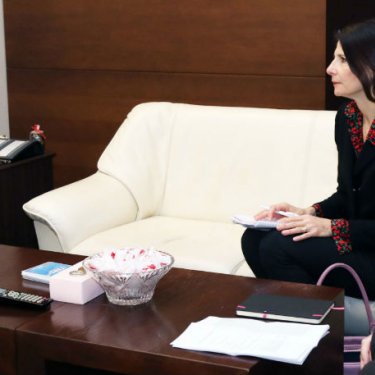RSF meets Bulgarian premier, proposes “road map” for boosting press freedom

At a meeting with Bulgarian Prime Minister Boyko Borisov in Sofia today, a Reporters Without Borders (RSF) delegation led by secretary-general Christophe Deloire called for ambitious measure to improve Bulgaria’s World Press Freedom Index ranking, which has fallen from 35th in 2006 to 111th now, the lowest of any European Union country.
After the meeting, Deloire said he hoped there could be an improvement.
“The prime minister is proud of his results as regards economic growth but he also has a duty to work on growth in press freedom,” said Deloire, who asked Borisov to give firm public undertakings that the harassment of critical media outlets and journalists will stop.
RSF offered to draft a “road map” for structural progress that will guarantee journalistic freedom, independence and pluralism and, more broadly, reliable news and information. The prime minister expressed interest in such a road map.
Before a cabinet meeting on 24 October, Borisov said he was paying attention to RSF’s recommendations and that therefore the best decision on the reform of print media distribution might be to put the post office in charge, so that the private sector did not handle it. But this will only make sense if a very diverse range of newspapers have access to the distribution network and are available at points of sale.
At today’s meeting, RSF also urged the prime minister to propose legislation that provides a structural basis for media pluralism and editorial independence and prohibits conflicts of interest and political exploitation of the media.
The RSF delegation, which included Pauline Adès-Mével, the head of RSF’s EU and Balkans desk, detailed Bulgaria’s press freedom problems for Borisov: the state-owned media’s lack of independence, government pressure on the media, how some owners use their media for political ends, the lack of transparency about media ownership and newspaper distribution, judicial harassment, the discretionary nature of political advertising and physical attacks against journalists.
RSF deplored recent “regrettable decisions” including the government’s support for the appointment of a prosecutor-general who has distinguished himself by his vindictive comments about journalists, and the appoint of a new public television director-general who has fired journalists for being too independent. The crisis at the public radio broadcaster BNR was also mentioned.
As one of the countries that signed the International Partnership on Information and Democracy during the UN General Assembly in September, Bulgaria must adhere to both the letter and the spirit of this document, which concerns the online information and communication space. This partnership has its origins in the Information and Democracy Initiative that RSF started.
During a previous meeting with Bulgarian President Rumen Radev on 17 October, RSF raised similar issues and condemned “the deliberate creation of a climate bordering on media civil war.”



